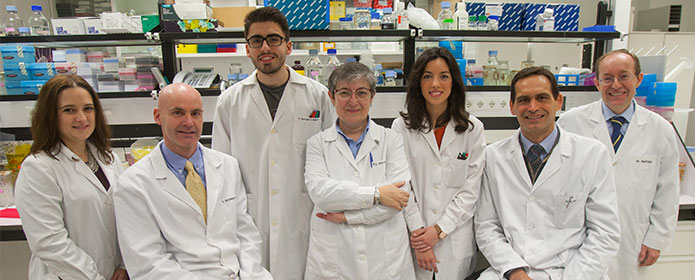Researchers at CIMA have identified a biomarker which offers prognosis after lung cancer surgery
TMPRSS4 plays a role in relapse and patients' survival time

Scientists at the Centre for Applied Medical Research (CIMA) and the School of Medicine of the University of Navarra have identified a molecule which predicts the prognosis of patients who have undergone surgery for lung cancer. This work, carried out in collaboration with the Bellvitge Biomedical Research Institute (IDIBELL) in Barcelona, and the Hospital Marqués de Valdecilla in Santander, has been published in the latest issue of the scientific journal Oncotarget, with a major impact on the field of oncology.
Lung cancer is the most lethal type of tumour in the world. In Europe every year approximately 300,000 people die from this disease. One of the main reasons is that it is usually initially asymptomatic and is detected in later phases when the cancer is very advanced. As María Villalba, a researcher at CIMA of the University of Navarra and the lead author of the work explains, "when lung cancer is detected in time and there is no metastatis, the standard treatment is surgery. The problem is that, for reasons as yet unexplained, about 40% of the patients have a relapse, which leads to a much worse prognosis".
The research work led by CIMA has identified a molecule, called TMPRSS4, which acts as a biomarker for the prognosis of lung cancer. "By means of complex technological systems called "microarrays" and advanced bioinformatic applications, we have proven that the presence of this biomarker is related with a higher risk of relapse and a shorter survival time", said María Villalba. These results were ratified in a sample of over 400 patients.
From a clinical perspective, the analysis of this biomarker may help to decide whether it is advisable to carry out a closer follow-up of a patient after lung cancer surgery, due to the high risk of relapse, or whether post-surgical chemotherapy should be applied. Whatever the case, this biomarker cannot yet be applied in clinical practice as a strict additional ratification is required. "Now our main priority is the development of new drugs to block the action of this molecule, as in this way we could prevent the patients' relapse", stated the Navarrese researcher. In fact, previous experiments carried out by the same research group have shown that the inactivation of TMPRSS4 slows down metastatis in animal models.
According to Dr. Alfonso Calvo, codirector of the work together with Dr. Juan Sandoval, "work must be continued in this line because we believe that this research, which has emerged from the synergy of the work of molecular biologists, physicians and bioinformatics technicians, will be beneficial for patients. However, the main problem we face is to find funding for the research and, therefore, we would encourage anyone who wishes to make a donation to contact us at acalvo@unav.es".
*Oncotarget. 2016 Mar 14. doi: 10.18632/oncotarget.8045.
